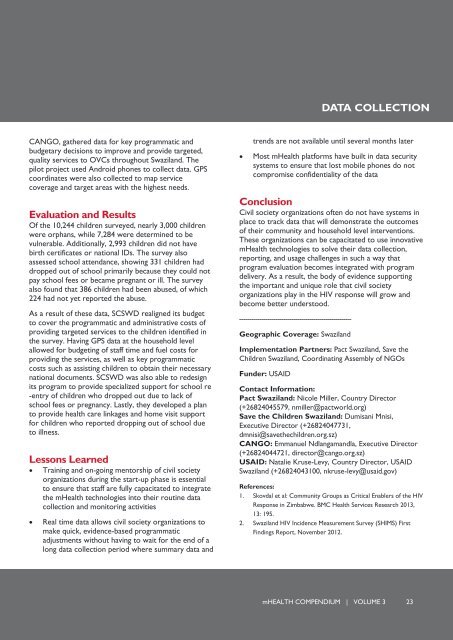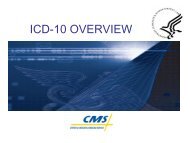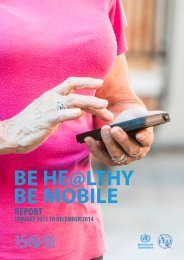mhealth_compendium_volume_3_a4_small
mhealth_compendium_volume_3_a4_small
mhealth_compendium_volume_3_a4_small
Create successful ePaper yourself
Turn your PDF publications into a flip-book with our unique Google optimized e-Paper software.
DATA COLLECTIONCANGO, gathered data for key programmatic andbudgetary decisions to improve and provide targeted,quality services to OVCs throughout Swaziland. Thepilot project used Android phones to collect data. GPScoordinates were also collected to map servicecoverage and target areas with the highest needs.Evaluation and ResultsOf the 10,244 children surveyed, nearly 3,000 childrenwere orphans, while 7,284 were determined to bevulnerable. Additionally, 2,993 children did not havebirth certificates or national IDs. The survey alsoassessed school attendance, showing 331 children haddropped out of school primarily because they could notpay school fees or became pregnant or ill. The surveyalso found that 386 children had been abused, of which224 had not yet reported the abuse.As a result of these data, SCSWD realigned its budgetto cover the programmatic and administrative costs ofproviding targeted services to the children identified inthe survey. Having GPS data at the household levelallowed for budgeting of staff time and fuel costs forproviding the services, as well as key programmaticcosts such as assisting children to obtain their necessarynational documents. SCSWD was also able to redesignits program to provide specialized support for school re-entry of children who dropped out due to lack ofschool fees or pregnancy. Lastly, they developed a planto provide health care linkages and home visit supportfor children who reported dropping out of school dueto illness.Lessons LearnedTraining and on-going mentorship of civil societyorganizations during the start-up phase is essentialto ensure that staff are fully capacitated to integratethe mHealth technologies into their routine datacollection and monitoring activitiesReal time data allows civil society organizations tomake quick, evidence-based programmaticadjustments without having to wait for the end of along data collection period where summary data andtrends are not available until several months laterMost mHealth platforms have built in data securitysystems to ensure that lost mobile phones do notcompromise confidentiality of the dataConclusionCivil society organizations often do not have systems inplace to track data that will demonstrate the outcomesof their community and household level interventions.These organizations can be capacitated to use innovativemHealth technologies to solve their data collection,reporting, and usage challenges in such a way thatprogram evaluation becomes integrated with programdelivery. As a result, the body of evidence supportingthe important and unique role that civil societyorganizations play in the HIV response will grow andbecome better understood.--------------------------------------------------------Geographic Coverage: SwazilandImplementation Partners: Pact Swaziland, Save theChildren Swaziland, Coordinating Assembly of NGOsFunder: USAIDContact Information:Pact Swaziland: Nicole Miller, Country Director(+26824045579, nmiller@pactworld.org)Save the Children Swaziland: Dumisani Mnisi,Executive Director (+26824047731,dmnisi@savethechildren.org.sz)CANGO: Emmanuel Ndlangamandla, Executive Director(+26824044721, director@cango.org.sz)USAID: Natalie Kruse-Levy, Country Director, USAIDSwaziland (+26824043100, nkruse-levy@usaid.gov)References:1. Skovdal et al: Community Groups as Critical Enablers of the HIVResponse in Zimbabwe. BMC Health Services Research 2013,13: 195.2. Swaziland HIV Incidence Measurement Survey (SHIMS) FirstFindings Report, November 2012.mHEALTH COMPENDIUM | VOLUME 3 23





